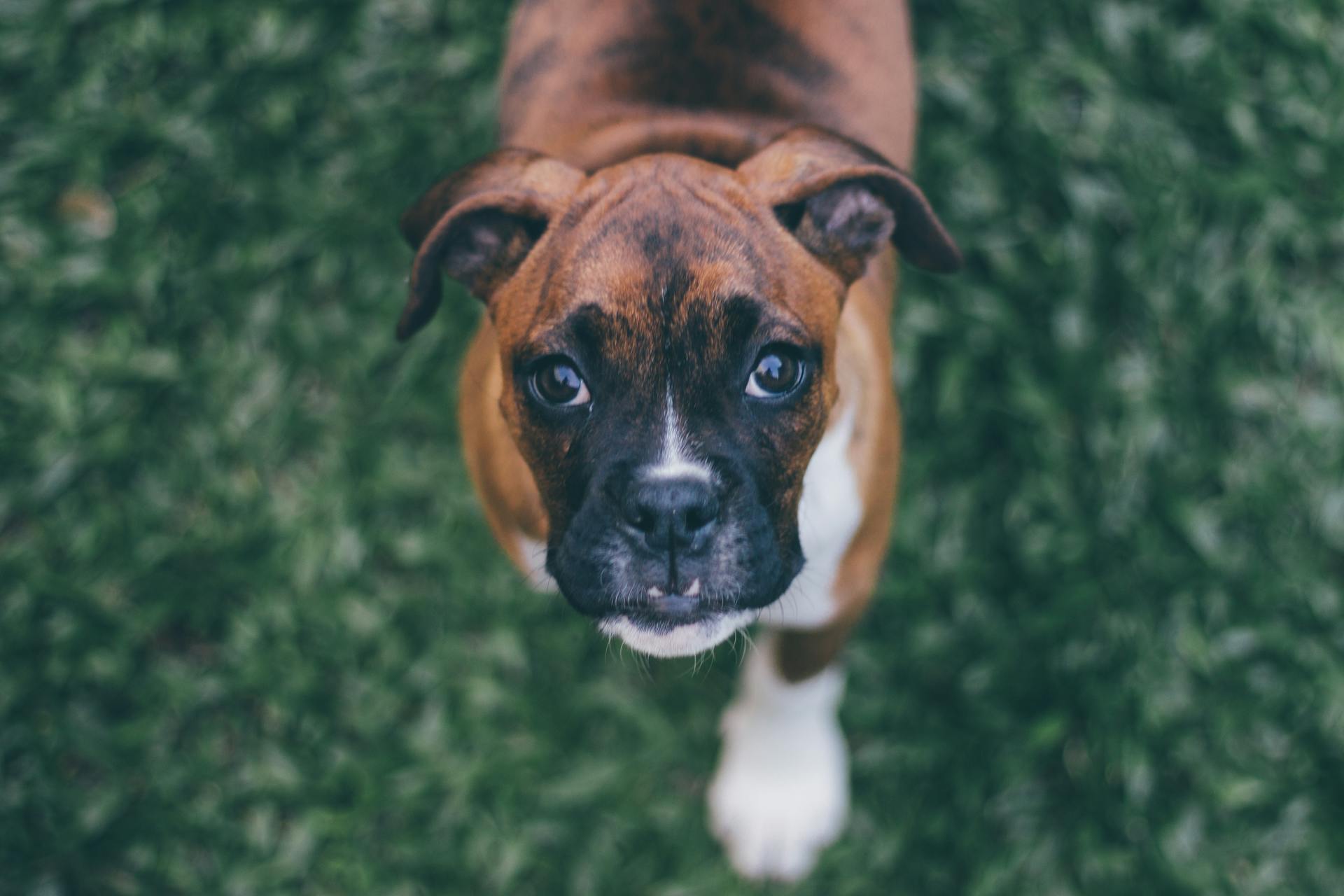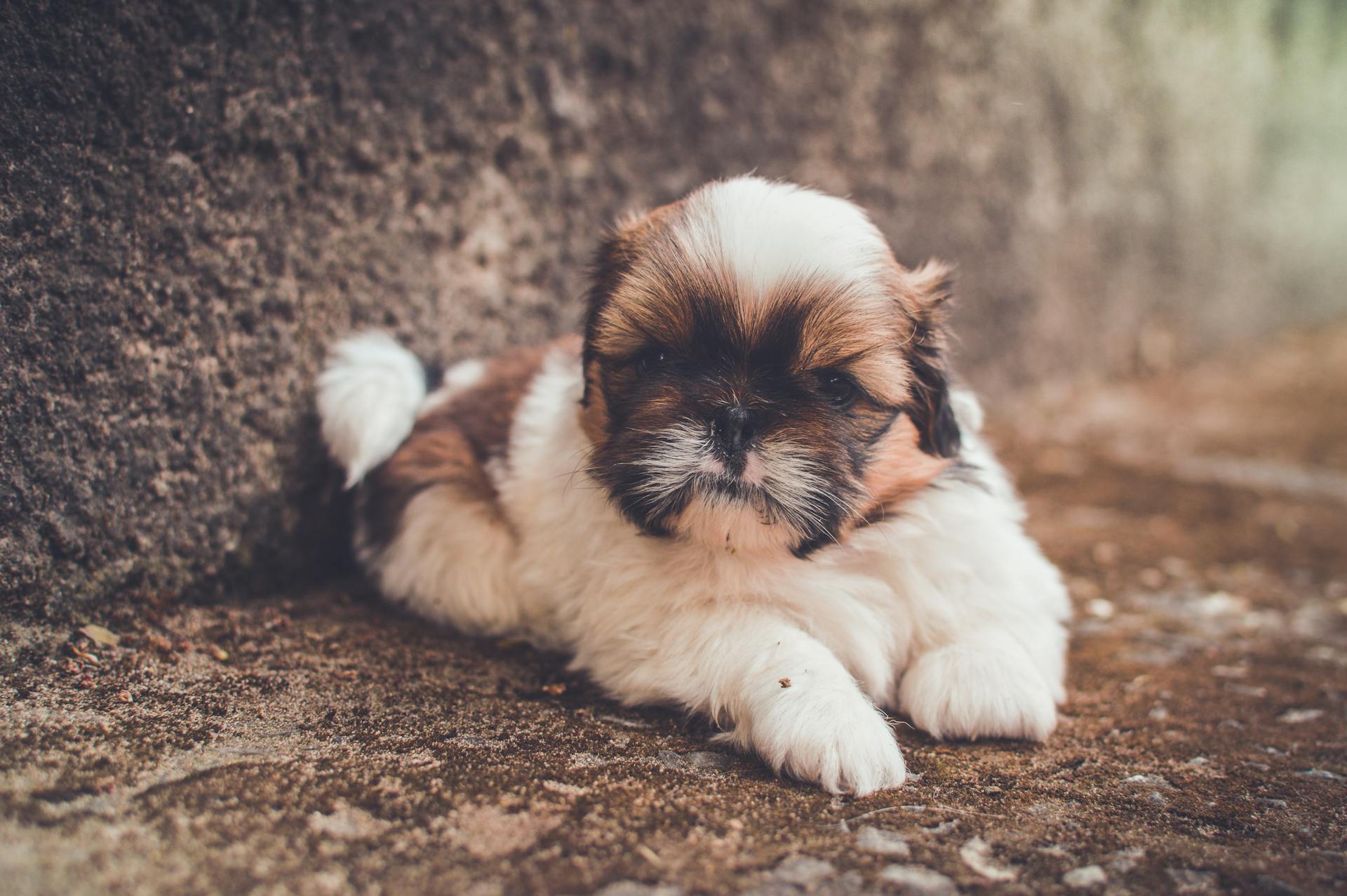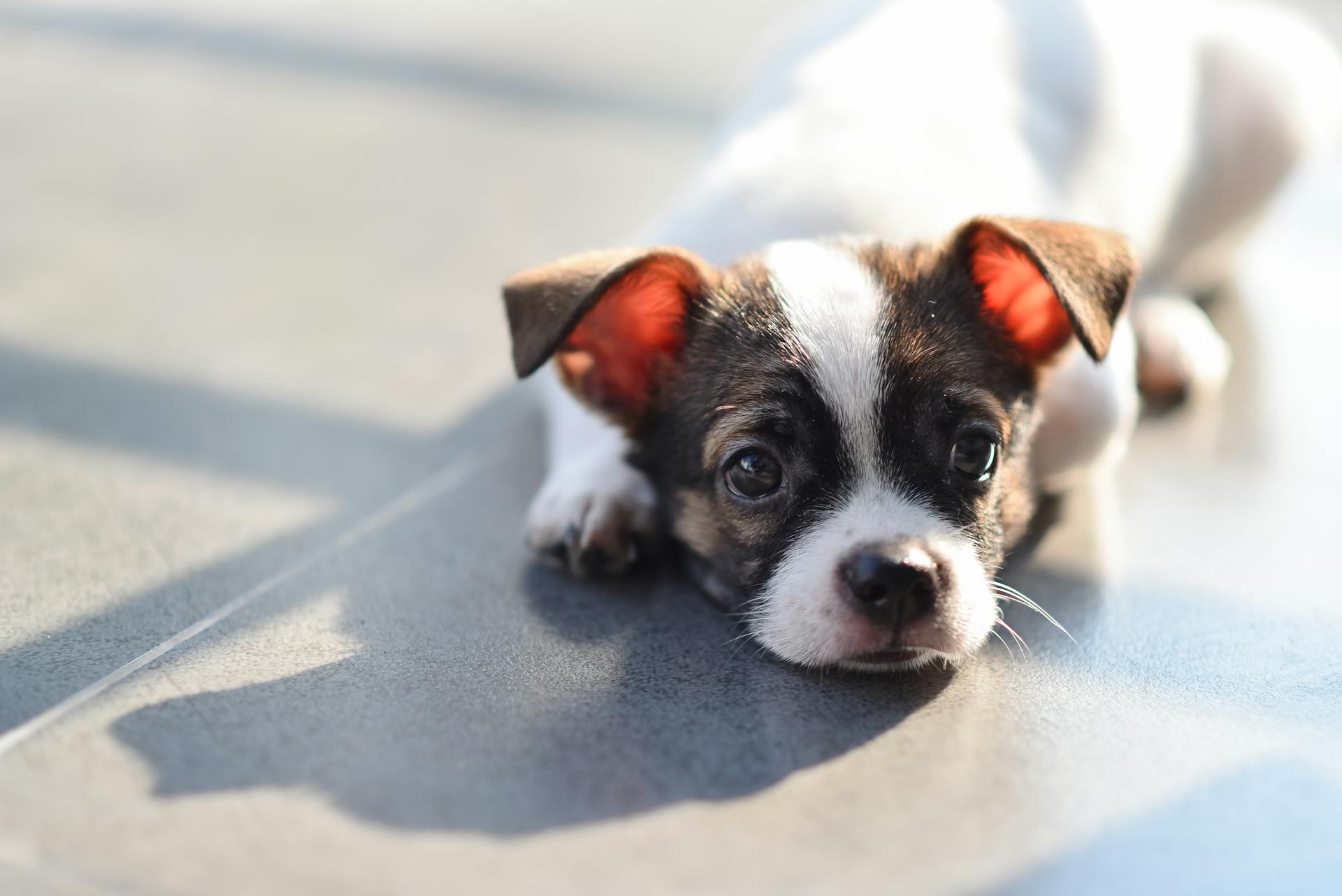
Having a baby Chihuahua is a big responsibility, but with the right care and attention, they can grow into happy and healthy dogs.
Chihuahuas are born after a gestation period of about 60 to 67 days, and they typically weigh around 2 to 5 ounces at birth.
Newborn Chihuahuas are blind and helpless, relying on their mother's milk for nourishment and warmth.
They start to develop their senses, including sight and hearing, around 10 to 14 days old, but their eyes don't fully open until around 3 weeks old.
With proper care, baby Chihuahuas can start to eat solid food around 3 to 4 weeks old, and they should be fully weaned by 6 to 8 weeks old.
As they grow and develop, it's essential to socialize them with people and other animals to prevent behavioral problems later in life.
You might like: Caring for a Maltipoo
Quick Facts
Baby Chihuahuas are a delight, and here are some quick facts to get you started:
They are one of the oldest dog breeds in the world, with a history dating back over 3,000 years in Mexico.
Originating from Mexico, these tiny dogs have been a beloved companion for centuries.
Baby Chihuahuas are small, standing at just 5-8 inches tall and weighing 3-6 pounds.
Their short or longhaired coats come in a variety of colors, making each one unique.
With a lifespan of 12-18 years, baby Chihuahuas are a long-term commitment, but one that's well worth it.
They are intelligent, loyal, affectionate, and playful, making them a joy to be around.
Here are some key characteristics of baby Chihuahuas at a glance:
With minimal exercise needs, baby Chihuahuas are perfect for city living or for families with small living spaces.
They are also easy to train with positive reinforcement methods, making them a great choice for first-time dog owners.
However, they may be prone to certain health conditions, such as luxating patellas, intervertebral disc disease, and hypoglycemia, so regular check-ups with a veterinarian are a must.
Overview
Baby Chihuahuas are renowned for being the world's smallest dogs, but they have a larger-than-life personality that makes them appealing to people of all ages.
They are fun-loving and busy, and like nothing better than being close to their people, often following them everywhere in the house and even riding along in tote bags when they go shopping.
Chihuahuas are intelligent and fast learners, capable of competing in agility and obedience trials with enthusiasm and success.
However, they can be willful little dogs, so it's essential to use positive reinforcement when training them, such as praise and food rewards.
Their small size means they can squeeze into tight spaces and escape through small gaps in the fence, so vigilant supervision is crucial, especially in new situations.
Despite their tiny size, Chihuahuas can stand up to larger aggressive dogs, but they need to learn to meet people in a friendly manner and socialize with children, adults, and other animals.
People who live with Chihuahuas become devoted to them, and many say that once you share your life with one, there will be no other dog breed for you.
For more insights, see: What Are the Different Kinds of Chihuahuas
Baby Chihuahua Basics
Chihuahuas are known for their tiny size, making them easy to handle and perfect for apartment living.
They come in different sizes and shapes, with some having an apple-shaped head and large eyes, while others may appear to be more fox-like in appearance.
Chihuahua puppies have a number of characteristics that set them apart from other puppies, including their vivacious personalities and unique facial features.
Here are some key characteristics to consider:
- Size: Small, 5-8 inches tall, weighing 3-6 pounds
- Coat: Short or longhaired, smooth or wirehaired, and can be a number of colors or a combination of colors.
- Temperament: Intelligent, loyal, affectionate, and playful
Their short coats require minimal grooming and are relatively low-maintenance in the grooming department, making them a great choice for busy owners.
Highlights
Chihuahua puppies are one of the smallest dog breeds in the world, making them easy to handle and perfect for apartment living.
They often have large personalities characterized by confidence and boldness, despite their tiny size.
Chihuahua puppies can be very loyal and affectionate, forming strong attachments to their owners.
Their short coats require minimal grooming and are relatively low-maintenance in the grooming department.
Chihuahua puppies tend to live relatively long lives, often reaching 15 years or more with proper care.
Here are some key characteristics of Chihuahua puppies:
- Tiny Size
- Big Personalities
- Loyal Companions
- Low Grooming Needs
- Long Lifespan
- Adaptable
- Good Watchdogs
- Playful and Energetic
- Variety
- Portable
Coat Color and Grooming
Baby chihuahuas with smooth coats and short hair are low maintenance and require minimal grooming, possibly just periodic brushing.
Longer coat chihuahuas need weekly brushings to prevent tangles and mats.
A long-haired chihuahua is definitely going to be a bit more work than a smooth-coated one.
Newborn
Newborn Chihuahuas are tiny and adorable, but they also come with some unique characteristics.
Some newborn Chihuahuas have a soft spot on their head, known as a molera, where their skull bones haven't fused together yet. This is usually nothing to worry about and can even be a normal part of their development.
Newborn Chihuahuas are often born with their eyes closed, and they might even have a tiny pink nose.
Their heads are proportionally large, which can make giving birth a bit tricky for mother Chihuahuas. This is why cesarean sections are often required to get them out safely.
Baby Chihuahuas are usually born in litters of two to five, and they're extremely small, weighing only a few ounces.
Chubby Puppies
Chubby puppies are a normal sight in baby Chihuahua households. It's not uncommon for very young Chihuahua puppies to have proportionally big tummies while they're growing.
Making sure your puppy is getting enough activity is crucial. Baby Chihuahuas are usually full of energy and love extra playtime.
If your puppy is over six months old and still seems a little chunky, it may be time to cut back on their food. A veterinarian can help you determine the right amount of food for your puppy's age and size.
Enjoy seeing your chubby puppy with their adorable round tummies while they last, as they tend to slim down as they transition into adulthood.
Additional reading: El Paso Chihuahuas Menu
Physical Characteristics
Baby Chihuahuas are ridiculously tiny, weighing as little as 2.5 ounces at birth.
They can grow rapidly, more than doubling in size in their first few weeks of life, and are usually finished growing by the time they're about 18 months old.
Newborn Chihuahua puppies are born with floppy ears, which will often become erect as they grow older. Some may take longer than others for this to happen, and it's not uncommon for their ears to flop or drop temporarily during teething.
Their big heads can cause difficulties during natural birth, making a Cesarean section necessary in some cases.
Take a look at this: When Do Chihuahuas Ears Stand up
Their Size
Chihuahuas are the world's smallest dog breed, weighing as little as 2.5 ounces at birth.
Their small size is part of what makes them so endearing to people. Newborn puppies can weigh as little as 2.5 ounces, but they'll quickly double their size as they increase in weight by 5 to 10 percent each day until they reach 2 pounds or more.
They are usually finished growing by the time they are about 18 months old. Chihuahua puppies can grow rapidly, more than doubling in size during their first few weeks of life.
Larger newborn pups might be born at 5 ounces, reaching a top weight of 6 pounds or so at 12 months.
Floppy Ears
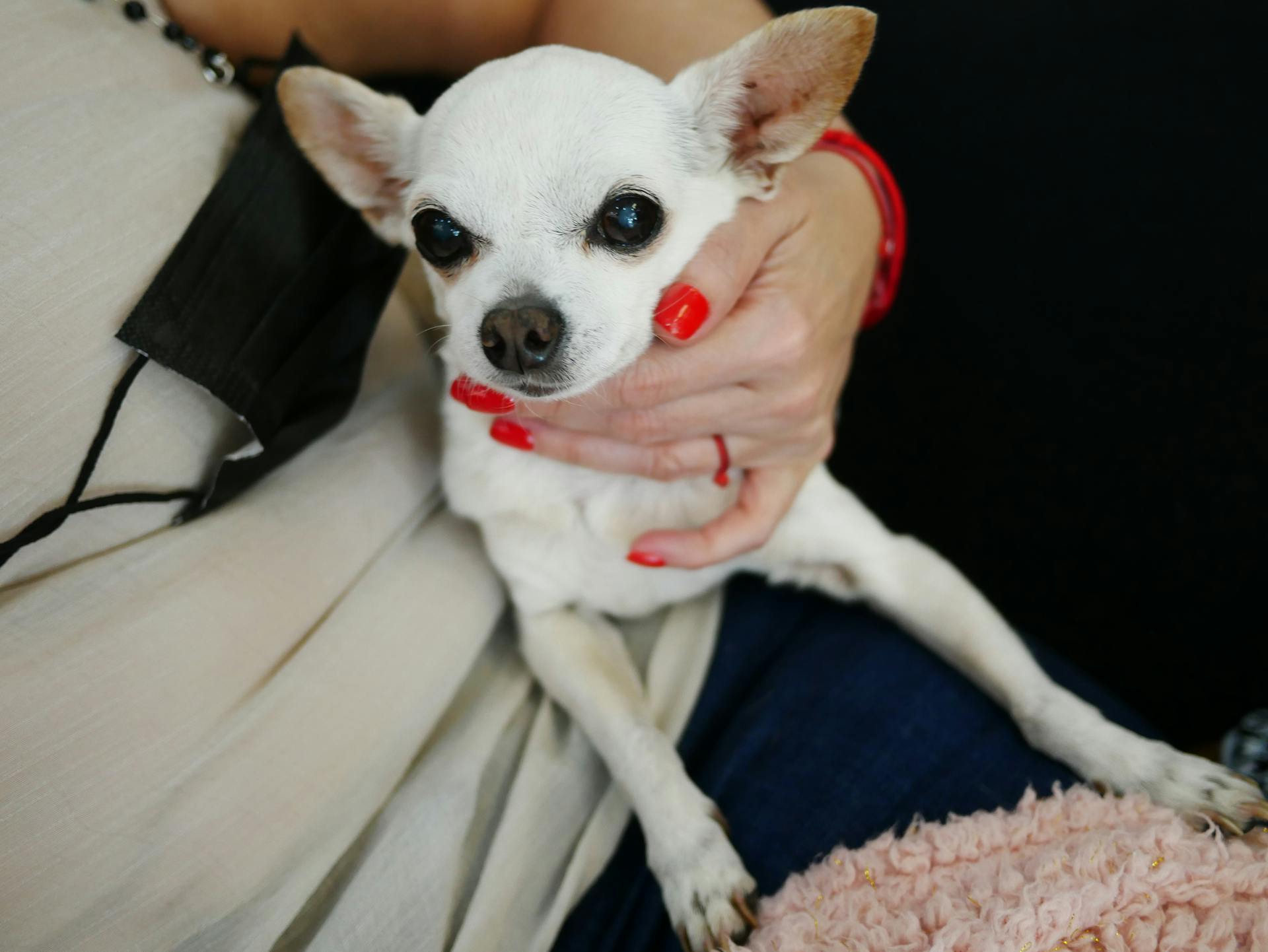
Chihuahua babies are born with floppy ears.
Most of the time, their ears will become erect as they grow older.
Their ears begin to stand up around 3 months of age.
Some may take longer than others for this to happen.
If yours has grown and is no longer a puppy and its ears are still floppy, then you have a rare Chi dog.
Hypoglycemia becomes less of a threat as they age.
The molera that the puppies are born with usually closes most of the way by the time the dogs become adults.
Intriguing read: Are Chihuahuas Good for First Time Owners
Health and Care
Chihuahuas are people dogs and they need regular exercise to stay happy and healthy. They'll go until they drop, so it's essential to ensure they don't tire themselves out, especially on hot days.
A daily walk and supervised romp around the yard are great ways to keep your Chihuahua active. They'll also enjoy playing with toys and going on adventures as long as you are.
If you notice your Chihuahua is underweight or overweight, it's crucial to schedule a check-up with the vet. They could have an underlying illness or a medical condition like an underactive thyroid or diabetes.
Health

If you think your Chihuahua is underweight, schedule a check-up with the vet as soon as possible.
They could have an underlying illness making them lose weight or fail to thrive, and a vet can help identify the issue.
A high quality puppy food can encourage growth in your puppy, so make sure to feed them a nutritious diet.
If your Chihuahua appears overweight and it isn't due to overfeeding, visit the vet to rule out any underlying health issues.
Underactive thyroid or diabetes can cause weight gain in young small breeds, and a vet can diagnose and treat these conditions.
Don't hesitate to contact your veterinarian if you're in any doubt and are concerned about your puppy's health.
Here's an interesting read: Common Health Problems with Chihuahuas
Care
Chihuahuas need regular exercise and training to stay happy and healthy.
They enjoy walks, supervised romps around the yard, and retrieving toys, and will go until they drop, so it's essential to ensure they don't tire themselves out, especially on hot days.
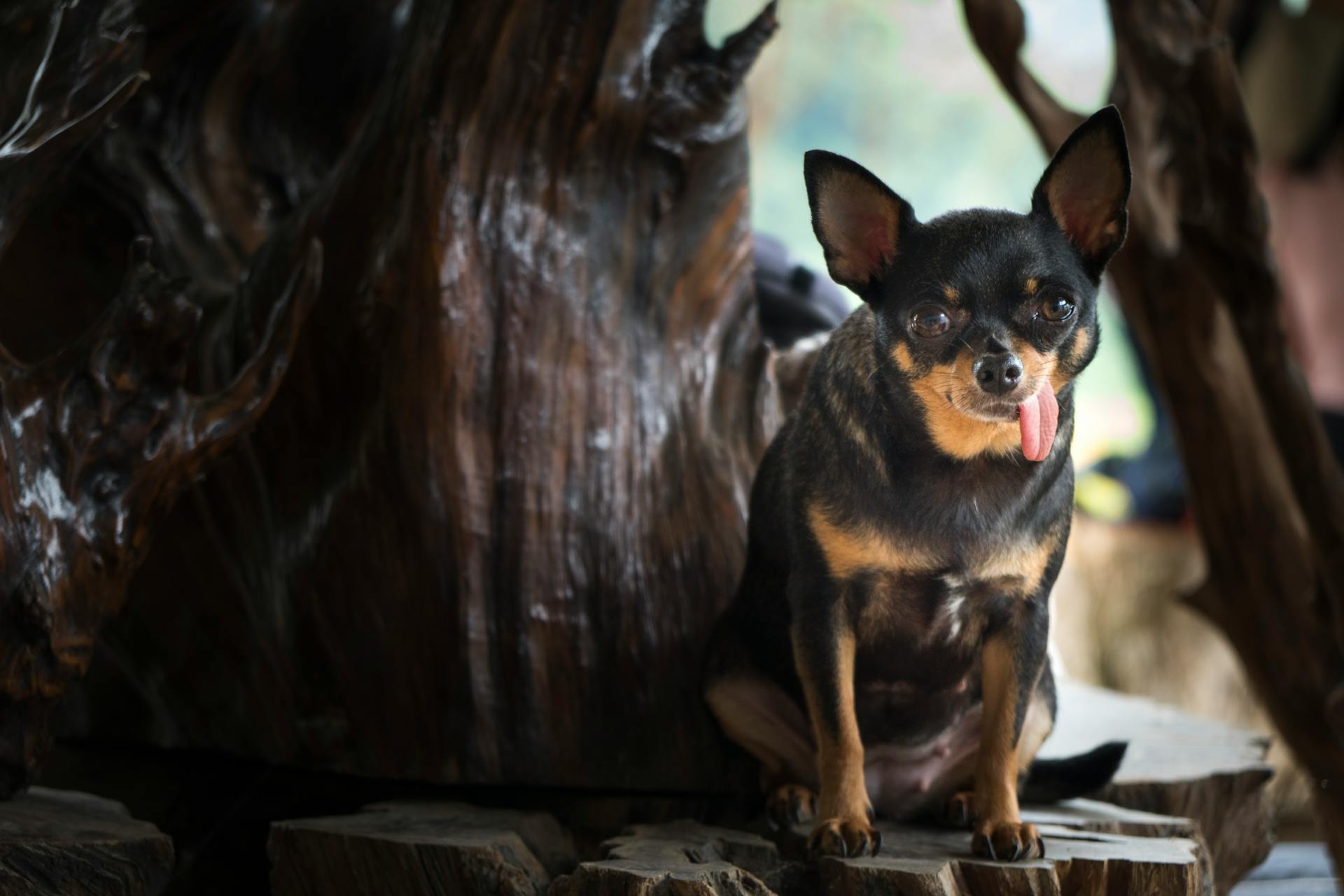
Your Chihuahua will meet many different dogs and people in class, contributing to his socialization, and learning the manners all dogs should know.
Puppies must go out as soon as they wake up in the morning, after every meal, after naps, during playtime, and just before bedtime to prevent accidents.
Using a crate to confine them when you're unable to supervise them will teach them that they can control their bladder and prevent accidents in the house.
Chihuahuas are prone to hypoglycemia due to their small size and lack of fat around their liver, so they need to eat frequently to maintain their energy levels.
Too much exercise or play can trigger a hypoglycemic attack, so it's crucial to monitor their activity levels and provide regular meals to prevent this.
Chis with hypoglycemia should be fed a sugar-based liquid, such as sugar in water, through an eyedropper, and you must treat hypoglycemia immediately to prevent shock and death.
For your interest: Mini Dachshund and Chihuahua Mix
Feeding
Feeding your Chihuahua is a crucial part of their care. They need to eat frequently, especially as puppies, to avoid hypoglycemia, a condition that can be life-threatening.
A highly active Chihuahua will need more food than a couch potato dog, so be sure to adjust their diet accordingly. The quality of dog food also makes a difference, with better food requiring less quantity.
Chihuahuas usually reach their adult weight between 9-12 months of age, but they can continue to grow until approximately 18 months. Standard Chihuahuas shouldn't be over 6lbs in weight.
The recommended daily amount of food for an adult Chihuahua is 1/4 to 1/2 cups of high-quality dry food a day. However, this can vary depending on size, age, build, metabolism, and activity level.
Dogs are individuals, just like people, and they don't all need the same amount of food. If your Chihuahua is still growing a lot past 9-12 months of age, it's best to consult with your veterinarian to rule out any issues with overfeeding.
Readers also liked: Baby Pomeranian Dog
The Molera
The Molera is a normal and extremely common condition in Chihuahua puppies. It's a hole in the skull that typically closes by the time they're six months old.
Chihuahua puppies with a molera can be vulnerable to injuries, so it's essential to be gentle when handling them, especially around the head. My own Chihuahua, Lucy, has this issue, and I've learned to be extra careful.
If a Chihuahua puppy still has a molera by the time they're a year old, they will likely have it for life. This means it's crucial to be mindful of their fragile head when they're six months old or younger.
Related reading: How Long Do Applehead Chihuahuas Live
Grooming
Grooming is an essential part of caring for your baby chihuahua. Depending on their coat, they may require different levels of grooming.
A baby chihuahua with a smooth coat and short hair is relatively low maintenance, requiring only periodic brushing to stay clean.
Longer coat chihuahuas, on the other hand, need weekly brushings to prevent tangles and mats from forming.
This extra grooming will help keep your long-haired chihuahua looking and feeling its best.
Frequently Asked Questions
Are Chihuahua puppies good pets?
Yes, Chihuahua puppies can make great pets for families who want a loyal and affectionate companion. They thrive in calm, comfortable homes where they can receive plenty of attention and love.
Featured Images: pexels.com

